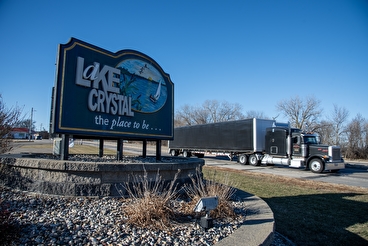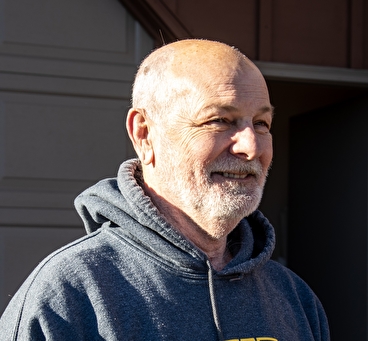
Profile: Jim Baker, Lake Crystal, Minn.
As a long-time transportation professional, Jim Baker spent a career overcoming the challenges of moving goods between small communities across Greater Minnesota and the Midwest. Now retired and living in one of those communities, Baker works every day to overcome a more personal transportation challenge.
“You cannot tell by looking at me that I can't see you. My eyes don't reflect it. I don't squint, my eyes don't wander while I look at things,” he says. “When I open my eyes, I sit up in bed and I have to acclimate to the landscape that I'm provided… and that affects my vision every single day.”
When he was 50, Baker was diagnosed with Stargardt Disease, a rare genetic condition that often causes degenerative loss of central vision in both eyes. He’s been legally disabled since 2017. As his sight became an increasingly serious concern, he had to leave the career in transportation that he had dedicated himself to.
“I had spent my whole life directing transportation activities…then, suddenly, I had no keys.” For much of his career, Baker worked with freight carrier Roadway Express in a number of roles —loader, driver, maintenance, sales, and management. He had been stationed in towns in Iowa and Illinois before eventually settling into a position in Mankato in south central Minnesota. There, he earned a master's degree in geography from Mankato State University and went on to work in distribution at Taylor Corporation before needing to retire at age 62 as his sight continued to decline.
Like many people who settle in rural communities, Baker chose Lake Crystal (pop. 2,543) to be close to his children and because it reminds him of where he grew up—Mount Vernon, Iowa. “The only difference is the lake,” he says. “The people are just good, honest farmers. Small-town people. They’re very easy to make friends with and socialize with.” He now lives in a home near the lake with his partner, Susan.

Although his particular condition is rare, the issues Baker faces getting around in a rural community are common to others with personal mobility challenges or whose access to on-demand transportation becomes restricted as they age. Transportation options readily available in urban areas, such as public transportation, taxis, or ride-sharing services, may not have enough demand to sustain them in a rural community like Lake Crystal.
Baker has learned to do many everyday errands within a 20-minute walking trip—usually using his cane or accompanied by his dog, Bernie. “I've got a pharmacy. I've got the post office, the bank, a grocery store. Everything is reachable, but if it rains, if it snows—Any inclement weather, I'm grounded. It's a whole different dynamic to life.”
Round-trip cab fares for these types of errands are cost-prohibitive, so anytime or anywhere Baker is unable to walk he needs to find a ride. Usually he can schedule rides with Susan, but when that doesn’t work he asks other friends. Asking for rides has not come easy, though.
“Dealing with disabilities is so much different than I ever imagined it could be…[the] pride I had in being able to do things when I wanted, as I wanted,” Baker says. “Then all of a sudden, I had to swallow my pride and learn how to ask for help.”
This dynamic introduced a new element into his relationships: “Susan and I have had to make a lot of time for discussions. How do we deal with it? How do we talk about it? The conversation and the interaction between partners, between neighbors, between family members, that all changes.”
For medical appointments 15 miles away in Mankato or 90+ miles away at Mayo Clinic in Rochester, Baker can arrange a ride through the county with a taxi service that in turn is reimbursed through Medicare. One frustration is that trips provided by Susan or neighbors are reimbursed at rates about one-third that of business travel—making these trips too costly, even though they would be more convenient to arrange. Another related challenge is scheduling:
“Do you make the appointment and then find the ride, or do you find a ride and then try to make the appointment to fit the ride? That is a terrible way to do business. You're just on the phone four or five times trying to balance the ride with the appointment, and it can be terribly frustrating.”
In one story Baker shares, his medical appointment ran long and when he went to catch his scheduled ride, it had already departed, stranding him. In another anecdote, the clinic schedule was running behind and he had to leave before the appointment, missing it completely because his scheduled ride could not continue waiting. The fact that rides can’t be scheduled more than a month in advance provides another dimension to this complex puzzle.
In addition, tackling his transportation challenges consumes a significant amount of time. “In Lake Crystal, there are carriers in Fairmont, New Ulm, St. Peter, Mankato, Owatonna. But they all take care of very localized, regionalized boundaries…I found out there's not one real number, one contact,” Baker says. “It's been a mishmash and… just drove me nuts. I got on the phone and started calling around. And I'm still calling around.”
These calls have developed into good relationships with contacts at the Minnesota Council on Transportation Access (a Minnesota-wide resource that coordinates regional providers), as well as national nonprofit organizations such as AARP, the National Federation of the Blind, and National Aging and Disability Center. In addition to staff at Blue Earth County, Baker has become acquainted with providers such as True Transit in Mankato and other regional private transportation companies.

Having developed this knowledge base about both options and strategies for getting around south central Minnesota, Baker has sought to help others and share reflections learned on his own journey.
“I have become very aware of how insensitive, how naïve I was at understanding how other people could feel if they are limited,” he says. “...the understanding that other people might need you to reach out and assist them comes way more naturally now than it did. My fuse is longer, my tolerance is much stronger.”
“I have a conference call once a month with other blind folks…there are certain people that I've talked to that just essentially give up...That's not a good way to live,” he says. “It [takes] a consistent effort that you have the conversation, you bring up the topic, and then you try to put out ideas.”
Baker expresses some surprise, amusement, and gratitude about having become an informal transportation resource in his own right. He has received calls from people in Waseca, Albert Lea, New Ulm, and St. Peter who have heard about his knack for helping people connect. Although he often begins by referring people to their county human services department, on one occasion he found himself organizing a luncheon among a group of old friends living miles apart in different towns.
“One of the things that I do tell them is, treat your friends kindly. Because they're going to probably drive you someplace and it's much easier to have somebody smile at you,” he says. “If you end things with a smile, the other person is smiling. You're better off for it.”